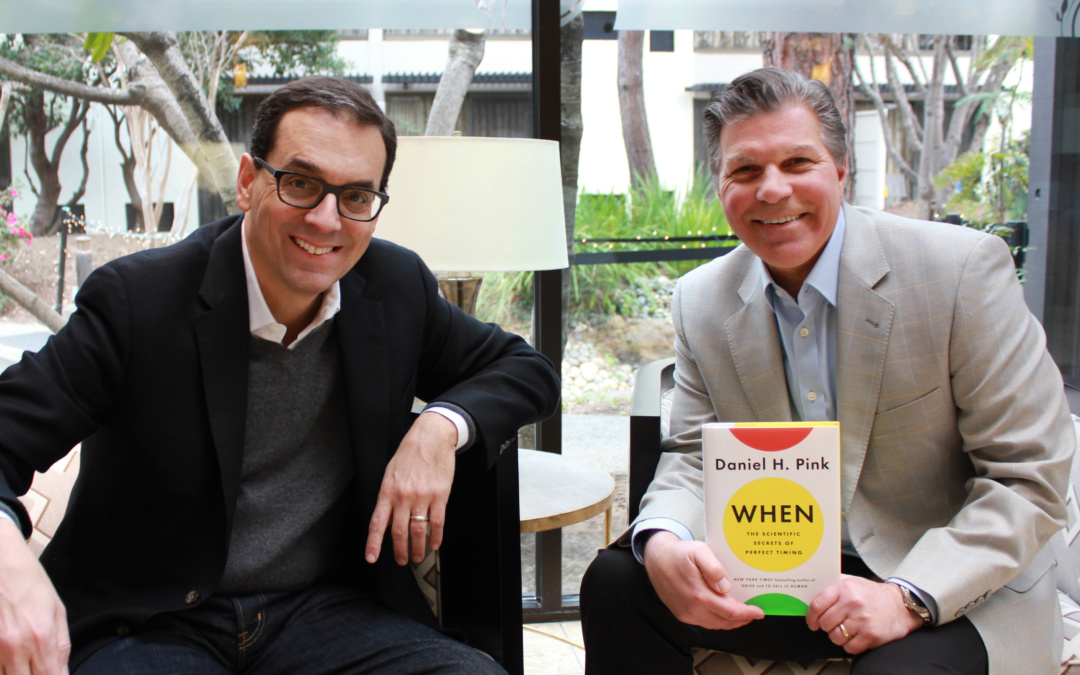
Dan Pink Reveals The Perfect Time For Meetings, Sales Pitches, And Creative Tasks
Article Published by: forbes
The famous TED speaker and New York Times bestselling author Daniel H. Pink, along with his team of researchers, spent two years analyzing more than 700 studies in fields ranging from economics to psychology to unearth the hidden science of perfect timing. I recently sat down with Pink to talk about the results in his new book, When.
Specifically, we talked about Pink’s research and what it reveals about the timing of meetings, sales pitches, and creative tasks.
When to time meetings
Pink says the biggest mistake business professionals make when scheduling meetings is “lack of intentionality.” In other words, we set meetings when it’s convenient without considering whether the time of day unleashes the team’s best ideas. “When we schedule meetings, we only think about one criterion—availability,” says Pink. “Instead, we should be thinking about what kind of meeting it is: analytical, administrative, creative. We should be thinking about what type of people are there. Are they morning people or evening people?”
According to Pink, your decision on when to hold a meeting should be a strategic one, not a decision made out of convenience. In one extraordinary study, a group of business school professors studied whether a CEO’s mood during earnings calls impacted the stock price. They studied 26,000 earnings calls from more than 2,000 public companies over a period of six years. They found that the time of day influenced the emotional tone of the conversations, and by extension, perhaps even the company’s stock price. Calls held first thing in the morning—when moods are generally high—turned out to be reasonably upbeat and positive. The tone grew more negative as the day progressed, especially if the calls were held in the early afternoon when Pink says our moods tend to dip (before rebounding after five o’clock). “Afternoon calls were more negative, irritable, and combative than morning calls,” writes Pink.
The takeaway: When you can, schedule important calls and meetings earlier in the day.
When to time sales presentations
Pink’s research shows that when we approach a decision, we come to the table with a ‘default position.’ Asking your boss for a raise? Their default position might be to say “no.” Approaching a potential customer to make a sale? Their default position might be to say “no.” Once again, timing matters.
Pink says salespeople are more likely to overcome a prospect’s default position earlier in the day—when moods are elevated—or immediately after a short break. We all suffer from cognitive fatigue. The brain consumes a ton of energy and we get tired from all that thinking. We need short, frequent breaks to achieve peak performance.
The takeaway: Schedule a sales call in the morning or after your prospect comes back from a break.
When to time creative tasks
Dan Pink surprised me with the timing of this activity. I assumed that if our energy levels are highest in the morning, it would be the best time to do our most creative work. Not necessarily, says Pink. Think about the mood cycle once again, Pink reminded me. In general, our positive moods rise in the morning, dips in afternoon, and rises again in the evening beginning around 5 p.m. The second thing to keep in mind is “vigilance.” Vigilance refers to our cognitive ability to be hyper-focused and to keep distractions at bay. Vigilance spikes in the morning. The research shows that analytical decisions are best made in the morning hours precisely for this reason. One study found that students perform better on math tests in the morning. Math requires sharpness, vigilance and focus.
But all brainwork is not the same. ‘Aha moments’ or creative insights often occur later in the day after 5:00 p.m. or so. At the time, most of us have an elevated mood and less vigilance. According to Pink, “At those looser moments, a few distractions can help us spot connections we might have missed when our filters were tighter.”
Takeaway: Tackle analytical problems in the morning and save creative pursuits for later in the afternoon and early evening.
Our cognitive abilities fluctuate during the day—often extremely so. Sometimes we’re sharper, faster, or more creative. Knowing when you’re at your best for specific tasks could give you a competitive edge.
About Scott Livengood
Scott Livengood is the owner and CEO of Dewey’s Bakery, Inc., a commercial wholesale bakery with a respected national brand of ultra premium cookies and crackers.
Previously, Scott worked at Krispy Kreme Doughnuts for 27 years, starting as a trainee in 1977. He was appointed President of the company in 1992, then CEO and Chairman of the Board.
Scott has served on numerous boards including the Carter Center, the Calloway School of Business and the Babcock School of Management, Habitat for Humanity of Forsyth County, and the Winston-Salem Chamber of Commerce.
He started a new business, StoryWork International, in 2016 with Richard Stone. The signature achievement to date is LivingStories, a story-based program for improved patient experiences and outcomes in partnership with Novant Health.




